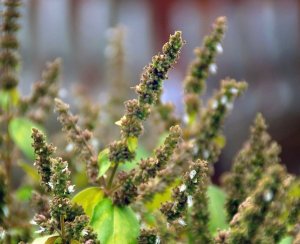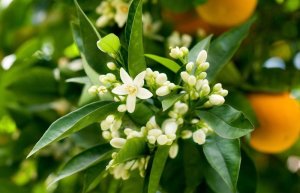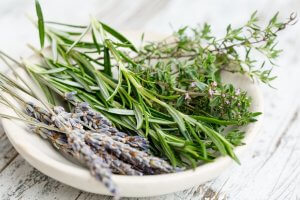Aromatically, spicy red cedar and deep, dark patchouli often combine as base notes to enhance warm, sensual and rich fragrances.
While these two essential oils can stand alone for their properties and health benefits, they are most frequently used in tandem. Due to its warm properties, Cedarwood blends well with herbal oils like sage, woody oils like Cypress and spicy essential oils like patchouli.
It is for these reasons that our master perfumers often utilize the aromatic power of both cedar and patchouli in the base notes of the endless array of fragrances we create for the commercial marketplace.
History And Benefits Of Cedar Essential Oil
Known as “the wood of the gods,” cedar essential oil was used for centuries in India, ancient Egypt, and other parts of Africa and Asia. Considered a holy wood, its use was confined to the construction of temples and altars and in religious blessings and ceremonies.
It is believed this essential oil may have originated in Tibet, as the tree from which this oil is extracted thrives only in colder climes and the Himalayas provided the perfect environment. From there, its use spread to India where it became integral to Hindu religious rituals.

Early records reveal that cedarwood essential oil was one of the very first extracts ever used in human history, both a sedative and medicine. Historic texts explain how difficult this essential oil was to extract, and yet early civilizations couldn’t get enough of it.
Ancient Egyptians used this oil as part of their embalming process because it was known to repel insects and microbes that eat corpses. Native American tribes used this oil as part of their ceremonies to clear the mind and calm the spirit.
In the modern world, cedar essential oil is commonly utilized in the practice of aromatherapy. Its rich and woody scent is said to offer a variety of benefits for mental and physical health. Inhaling the aroma of cedar essential oil or absorbing it through the skin can affect heart rate, stress levels, blood pressure and breathing. When combined with a carrier oil such as jojoba, sweet almond, or avocado, cedar essential oil can be applied directly to the skin or added to baths.
The Beauty Of Patchouli Essential Oil
Native to the moist and tropical climes of Southeast Asia, an indigenous population known as the Tamil were the first to use and develop the plant they named patchouli. The word translates into green leaf because patchouli is derived from a green bush that’s part of the mint family.
The leaves of the plant can reach up to three feet in height. Delicate pink flowers with seeds bloom on the bush during the autumn season. They are integral to the creation of the modern patchouli scent that we all know and either love or hate today.

The Tamil used patchouli for medicinal purposes, insect repellent, and even added it to herbal teas. Over the centuries vis established trade routes, patchouli essential oil found its way through the Middle East where it was often bartered for silk goods and spices. The Romans used it as an appetite stimulant and in Egypt its was said that King Tut arranged to have 10 gallons of patchouli buried with him in his tomb. Early European traders were known to exchange one pound of patchouli for a pound of gold.
It is believed that patchouli leaves were introduced to Europe via Napoleon Bonaparte. He brought them from his campaign in Egypt and used them as moth repellents in prized cashmere and silken goods. About 30 years later in 1837, patchouli rose in stature from an insect repellent to a recognizable and well known element of fragrance. In 19th century India, patchouli oil became popular as a fabric fragrance and manufacturers used it as a moth repellent for fabrics that were exported to other countries.
The Modern Use Of Patchouli
During the 1960’s and 70’s and the American counterculture in America, the rich earthy and slightly minty aroma of patchouli became very popular among “hippies.” The fragrance soon became associated with free spirits, flowers, carefree lifestyles and barefoot men and women with long hair.
Most of the Patchouli used at this time in history was either synthetic or of very low quality. In its own odd way, patchouli is the perfect generational scent. The process of soaking and fermenting the patchouli leaves before distillation symbolizes the breakdown of nature’s different stages of life.
The popularity of patchouli has increased over the years and its use has extended into many other areas. Our team often relies upon patchouli as an important ingredient in their perfumes and skin care creations. It promotes a smooth, glowing complexion, reduces signs of aging and the appearance of wrinkles, scars, and stretch marks.
In aromatherapy, patchouli is typically used to treat anxiety, insomnia, indigestion and fatigue just to name a few. On an emotional level, patchouli essential oil is also said to help promote self-love and acceptance. Its calming effect is very effective for relaxation and meditation. Due to its many diverse associations, patchouli is and always will be a “love or hate it scent.”
Some Popular Fragrances Featuring Cedar and Patchouli
The following scents are broken down into two distinct categories; those that incorporate cedar for their base notes and those that feature patchouli.
Yuzi Neroli
This luxurious Alpha Aromatics scent opens with a top note featuring bitter yuzi, which is a Japanese citrus with half-lemon, half-lime overtones. Its dryness accompanies the remaining ingredients, which consist of nutty apricot kernel and bright grapefruit. Light, floral and bitter neroli dominates the heart note and leads to the finishing base note of warm and woody cedar.

Neroli Citron
The top note of this floral citrus scent is a complex blend of dry citron, fresh bergamot, ,fruity mandarin and apricot and spicy cassis. Garden herbs, lightly floral neroli and sharp carnation forms the heart note which then fragrantly gives way to a base note of warm cedar and creamy sandalwood.
Blue Lotus And Moss
Woodsy and floral elements combine to form the top note of this haunting, tropical fragrance. An aromatic heart note comprised of romantic night blooming jasmine and verdant green mosses transport the wearer to the wonders of the forest in spring and summer. An extra punch is provided by the intoxicating essence of Egyptian blue lotus, which was favored by Cleopatra in centuries past. A warm sensual cedar-dominating base note completes the fragrance.
Tamboti Woods
This rare fragrance derives from a dense, richly colored and sacred hardwood tree that is considered precious timber. It is found in Mozambique and other African sub-equatorial regions. The tree produces a unique, pleasant, creamy, slightly spicy and sweet-smelling sap that is tinged with a woody base note of fresh cedar.
White Tea and Thyme
A favored scent among hotels featuring an international clientele, its woodsy quality is especially appealing to Asian cultures that value the burning of incense. This crisp and clean fragrance opens with the calmness of white tea infused with invigorating citrus. A heart note featuring blends of night-blooming jasmine, delicate rose petals and sage balance the base note of strong, green thyme and woodsy, musky cedar notes that complete this beautiful and soothing fragrance created by our master perfumers at Alpha Aromatics.

Black Bamboo Pikake
This sensual, highly floral ,patchouli infused fragrance opens with a splash of dewy citron combined with creamy gardenia, highly fragrant and delicate pikake and tropical, spicy plumeria. A middle note of earthy star anise is followed by well-balanced base notes of soft, sensual bamboo, warm, rich patchouli and sandalwood.
Wild Sage Cassis
Tangerine, fresh clean lime, grapefruit, apricot and tart cassis form the top note of this comforting citrusy scent. A middle note of rich jasmine, bright lily and slightly bitter neroli blend to completion with a base note of crispy, dried sage and earth patchouli.
Tonka Bean
A flavorful bean from South America, tonic bean is one of the most delicious aromas in the world of fragrance. It belongs to the oriental category of perfume notes and is known for the intoxicating, complex fragrance of its seeds. They bear enticing top notes of milky, sweet vanilla, amber and cherry. A heart note of spicy cinnamon and clove and soft, bittersweet almond follows and blends into a base note of tobacco, patchouli and sandalwood that complete the fragrance.
The Master Perfumers Of Alpha Aromatics
At the helm of perfume creations for decades, our master perfumers are known for their meticulous selection of essential oils that are always the major component of all of our new fragrances.
Our chemists and researchers are experts at blending diverse essences into a one-of-a-kind balanced formulation; a process that requires much patience and painstaking research and repeated modifications — it is an accomplishment that cannot be measured by time.
Our superior perfumes are the result of cutting edge technologies performed in our 85,000-square-foot Technology Center located a stone’s throw from downtown Pittsburgh. The chemists and researchers behind the scenes lie at the heart of our constant state of innovation within the world of industrial science.
Our laboratories are equipped with the best state-of-the-art tools that money can buy. These include: gas chromatography, mass spectrometry, head-space analysis, distillation, extraction and quality control technology.
It goes unsaid that we have proven our mettle whenever it comes to translating any company’s vision into fragrance terms that will attract and engage consumers, and our one-of-a-kind scents are used for a myriad of products including: superior quality perfumes; scent branding; personal care products; candles and diffusers and fragrances for home products.
In Conclusion
If you’re a brand owner or purchaser, senior cosmetic chemist, product developer, product formulator, business development manager, packaging technologist or product development scientist, and you would like to incorporate either of these essential oils into your product or product line, submit an inquiry today and see what magic our fragrance oil purchasers can do for your company.
This blog was written with the knowledge and direction of our President, Arnold Zlotnik, our master perfumer, Roger Howell, and our amazing Alpha management and quality control team. Learn more about our team members, our commitment to creating the world’s finest, high quality scents and our dedication to meeting every environmental and quality standard set by RIFM, IFRA, Oregon Tilth, ISSA and the NPA.
 alpha aromatics®
alpha aromatics®